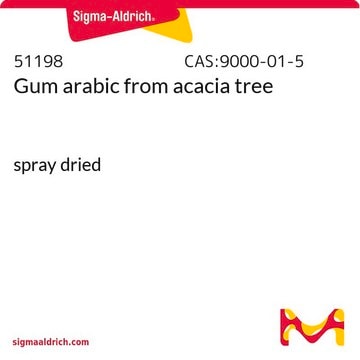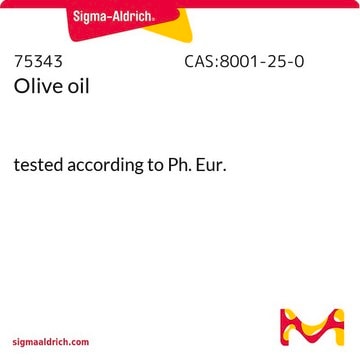G9752
Gum arabic from acacia tree
branched polysaccharide
Sinónimos:
Acacia gum
Iniciar sesiónpara Ver la Fijación de precios por contrato y de la organización
About This Item
Productos recomendados
biological source
plant (Acacia)
form
powder
color
white to faint beige
storage temp.
room temp
¿Está buscando productos similares? Visita Guía de comparación de productos
General description
Gum arabic from acacia tree is extracted from the branches of Acacia senegal and Acacia seyal trees. It is an edible dried gummy exudate. Gum Arabic has high solubility and is used in food industry as a stabilizer, emulsifier, flavouring agent, thickener and surface-finishing agent. It initiates turbidity or hinders sugar crystallization. Gum arabic inhibits color pigmentation and protein precipitation in wine production.
Application
Gum arabic from acacia tree has been used:
- as an emulsifying agent to determine lipase activity in shrimps
- for the visualization of mossy fiber sprouting
- as an immunogen and for coating microtitre wells in plate-trapped antigen ELISAs (PTA-ELISAs)
- for silver enhancement for immunohistochemistry
- as a component for Timm′s staining solution
- in nitrocellulose-based soil adhesion assay
- to separate few-layer graphene (FLG) from bulk graphite layers
Other Notes
Believed to be a branched polymer of galactose, rhamnose, arabinose, and glucuronic acid as the calcium, magnesium, and potassium salts with a mol. wt. of approx. 250,000.
To gain a comprehensive understanding of our extensive range of Polysaccharides for your research, we encourage you to visit our Carbohydrates Category page.
Storage Class
11 - Combustible Solids
wgk_germany
WGK 3
flash_point_f
Not applicable
flash_point_c
Not applicable
ppe
dust mask type N95 (US), Eyeshields, Gloves
Certificados de análisis (COA)
Busque Certificados de análisis (COA) introduciendo el número de lote del producto. Los números de lote se encuentran en la etiqueta del producto después de las palabras «Lot» o «Batch»
¿Ya tiene este producto?
Encuentre la documentación para los productos que ha comprado recientemente en la Biblioteca de documentos.
Los clientes también vieron
Acacia gum: History of the future
Sanchez C, et al.
Food Hydrocolloids, 78, 140-160 (2018)
Xenograft of human umbilical mesenchymal stem cells from Wharton?s jelly as a potential therapy for rat pilocarpine-induced epilepsy
Huang P, et al.
Brain, behavior, and immunity, 54(3), 45-58 (2016)
A quantitative method for the high throughput screening for the soil adhesion properties of plant and microbial polysaccharides and exudates
Akhtar J, et al.
Plant and Soil, 1-9 (2018)
Purification and characterization of an intracellular lipase from pleopods of whiteleg shrimp (Litopenaeus vannamei)
Rivera-Perez c, et al.
Comparative Biochemistry and Physiology. Part B, Biochemistry & Molecular Biology, 158(1), 99-105 (2011)
Intra-amygdaloid injection of kainic acid in rats with genetic absence epilepsy: the relationship of typical absence epilepsy and temporal lobe epilepsy
Gurbanova AA, et al.
The Journal of Neuroscience, 28(31), 7828-7836 (2008)
Nuestro equipo de científicos tiene experiencia en todas las áreas de investigación: Ciencias de la vida, Ciencia de los materiales, Síntesis química, Cromatografía, Analítica y muchas otras.
Póngase en contacto con el Servicio técnico









